

Updated: Monday, August 19, 2013 7:24 PM CDT
Post Comment | Permalink | Share This Post
 Hello and welcome to the unofficial Brian De Palma website. Here is the latest news: |
|---|
E-mail
Geoffsongs@aol.com
-------------
Recent Headlines
a la Mod:
Listen to
Donaggio's full score
for Domino online
De Palma/Lehman
rapport at work
in Snakes
De Palma/Lehman
next novel is Terry
De Palma developing
Catch And Kill,
"a horror movie
based on real things
that have happened
in the news"
Supercut video
of De Palma's films
edited by Carl Rodrigue
Washington Post
review of Keesey book
-------------
Exclusive Passion
Interviews:
Brian De Palma
Karoline Herfurth
Leila Rozario
------------
------------
| « | August 2013 | » | ||||
| S | M | T | W | T | F | S |
| 1 | 2 | 3 | ||||
| 4 | 5 | 6 | 7 | 8 | 9 | 10 |
| 11 | 12 | 13 | 14 | 15 | 16 | 17 |
| 18 | 19 | 20 | 21 | 22 | 23 | 24 |
| 25 | 26 | 27 | 28 | 29 | 30 | 31 |
De Palma interviewed
in Paris 2002
De Palma discusses
The Black Dahlia 2006

Enthusiasms...
Alfred Hitchcock
The Master Of Suspense
Sergio Leone
and the Infield
Fly Rule
The Filmmaker Who
Came In From The Cold
Jim Emerson on
Greetings & Hi, Mom!
Scarface: Make Way
For The Bad Guy
Deborah Shelton
Official Web Site
Welcome to the
Offices of Death Records


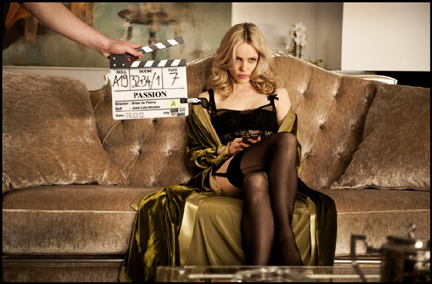
De Palma tells Wise about the Afternoon Of A Faun ballet sequence in Passion: "I've been fascinated by that ballet for years. It was on YouTube. It was shot in the 60s, a very grainy black-and-white video. I loved the idea – the dancers are interacting with each other and looking at themselves all the time. It was a shocker when it was first done, because it was so explicitly sexual. So I always wanted to use it. And when I saw the Corneau film, there was a scene where the detective says to the suspect, 'Where were you?' She says, 'I was at the ballet.' And I thought, 'Wow, now I have a place to put it.'" {Note: in the Corneau film, it was "at the movies", and De Palma saw the opportunity to make it "at the ballet" for his version.]
"I GET OFFERED A LOT OF THINGS I'M NOT REALLY INTERESTED IN"
Wise gets into the discussion of big screens and smaller screens, and De Palma laughs and tells him, "I saw Vertigo in VistaVision – in 1958 at Radio City Music Hall. No wonder it made an impression on me!"
"Nevertheless," Wise writes, "as his movies seem to be getting smaller again (Passion is being released here only on DVD), De Palma says he is not struggling to find work."
De Palma tells Wise, "I get offered a lot of things I'm not really interested in. I can work on big budgets, little budgets. I'm just interested in doing what interests me."
At the end of the article, Wise asks De Palma about potential retirement. De Palma tells him, "In the words of William Wyler, when the legs go, that's when you've gotta pack it in. My cinematographer is older than I am. He does Almodóvar's movies. He's 74. I watch him standing up all the time. I say, 'Why don't you sit down?' He says, 'If I sit down, I fall asleep.' I think that's waiting for me."
REMINDER
Tomorrow night (Monday) at 7pm, De Palma takes the stage at the Film Society Lincoln Center, where he will discuss Passion and take questions from the audience. The hour-long event is part of a series called "Summer Talks". The Lincoln Center website states, "Complimentary tickets will be available only at the Elinor Bunin Munroe Film Center box office on a first-come, first-served basis. Limit: One ticket per person." Video of each discussion will also be posted on the website (Filmlinc.com). Passion will open at Film Society on August 30.
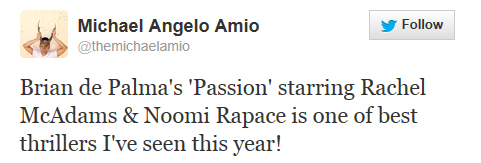
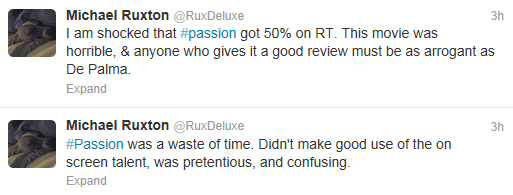
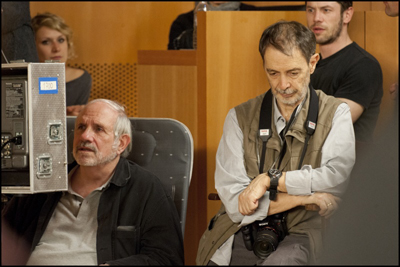
"Every film I make, I try and incorporate new technology in order to pre-visualise the movie from beginning to end, and modern programmes allow you to do practically everything. So I designed each storyboard, and when it came to printing them out, I had these huge stacks of the whole movie; I knew exactly what I wanted minute from minute on set."
Seymour then asks if De Palma believes in improvisation on the set. "Yes," De Palma replies, "you have to adjust your vision for the film according to what happens on the day. I focus really intently when I’m on set. I’m always looking for emotional shifts, for little interactions between the actors, for what’s happening to the weather or the light. If you have a plan to return to, it affords you the ability to freestyle a little bit. Filmmaking is like catching [lightning] in a bottle; you have to be adept at looking at what’s going on at that moment, because if it’s on the film it will be there forever."
STILL A LOT OF OPPORTUNITIES TO EXPLORE THE BOUNDARIES OF CINEMA
When Seymour asks what motivates him as a director, De Palma replies, "I’m motivated by big cinematic ideas and broad canvasses. I believe deeply in the big screen. A lot of independent films now are walking and talking movies, which hold little interest to me, while the top of the industry is dominated by comic books. There’s a lot of opportunity for people to explore the boundaries of cinema still – even if they’re working on a $2,000 budget – and I’d encourage anyone to do that."
Seymour concludes by asking De Palma for his advice to young filmmakers. Read the answer to that, along with the rest of the interview, at Ideas Tap.
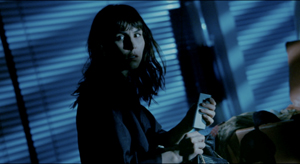 A couple of interesting Passion reviews were posted the other day. Michael Ewins begins his review with this paragraph:
A couple of interesting Passion reviews were posted the other day. Michael Ewins begins his review with this paragraph:Ewins states that, "like the best of De Palma, Passion evokes such a precise feel through framing, light and editing that you could follow the story just as well with the sound off," adding that "the fever-pitch finale is a wordless, cross-cut masterstroke." He concludes with the following two paragraphs:
"A final note – watch it twice. A first viewing will find you figuring out the tone, nodding toward the references and enjoying the ride as it picks up traction. The second time around those initial twenty minutes sit more comfortably – a whirlwind of office politics, sexual betrayal and callback setups (it threatens us with a doppelgänger motif and then holds it back for the duration), it plays more self-aware in the knowledge of what follows, and you gather that the slightly undisciplined structure is all in service of a greater good – those juicy auteurist cues.
"Passion is an extraordinary return to form for De Palma, and its presumed (not to mention expected) awfulness turns out to be gleeful, self-aware genre abandon – this is a mucky, perverse world full of ludicrous twists and turns, flashbacks, lesbian trysts and pill-popping anti-heroes. If you’re not having fun, you’re just not doing it right."
KEITH UHLICH ON 'PASSION'
Keith Uhlich posted a Letterboxd review of Passion, in which he states, "I'm totally with this movie right from the moment Rachel McAdams chokingly says, 'It's organic.'" Uhlich loves how Passion "is a tri-perspective thriller that moves from the cold, calculating blonde to the all-in vengeful brunette to the haunt-you-even-in-death redhead. The surfaces are so enticing, and the depth emerges from the collision of emblems—not just hair color but zeitgeisty products (Mac computers; Panasonic cell phones; an ill-fated Coca-Cola machine) and strata of art (an ass-cam advertisement that goes YouTube viral and the Jerome Robbins version of Afternoon of a Faun, which may or may not have actually been witnessed)."
Uhlich concludes, "The key scene for me is the one in which McAdams tearily talks about her twin sister (who of course appears subsequently with bloody scarf—this film's Hermès handbag—in murderous hand), if only because it brings me back to that great Mission: Impossible exchange between Jean Reno and Emmanuelle Béart, which concisely and poetically sums up the polarizing De Palma project: 'Is he serious?'/'Always.'"
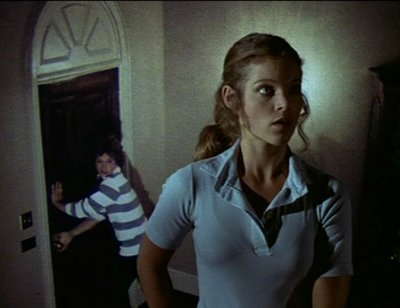 A new 35mm print of Brian De Palma's The Fury will screen at 7pm Thursday night as part of the University of Wisconsin-Madison Cinematheque series tribute to Roger Ebert. The series summer opened July 12 with Carol Reed's The Third Man. Cinematheque director Jim Healy told Madison.com that with the series, he "wanted to showcase the sheer range and eclecticism of Ebert’s tastes, from the great movies he loved to the guilty pleasures he enjoyed to the little-seen underdogs he championed," according to the article by Rob Thomas. A sidebar with Thomas' article includes a quote from Ebert about The Fury: "I'm not quite sure it makes a lot of sense, but that's the sort of criticism you only make after it's over. During the movie, too much else is happening."
A new 35mm print of Brian De Palma's The Fury will screen at 7pm Thursday night as part of the University of Wisconsin-Madison Cinematheque series tribute to Roger Ebert. The series summer opened July 12 with Carol Reed's The Third Man. Cinematheque director Jim Healy told Madison.com that with the series, he "wanted to showcase the sheer range and eclecticism of Ebert’s tastes, from the great movies he loved to the guilty pleasures he enjoyed to the little-seen underdogs he championed," according to the article by Rob Thomas. A sidebar with Thomas' article includes a quote from Ebert about The Fury: "I'm not quite sure it makes a lot of sense, but that's the sort of criticism you only make after it's over. During the movie, too much else is happening."
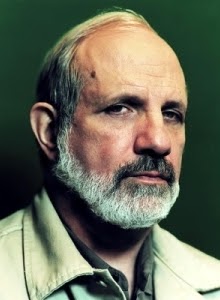 Cine Vue's John Bleasdale interviewed Brian De Palma at the Venice Film Festival last September, and posted the article today, as Passion is released on DVD and VOD in the U.K. and Ireland. Back when talking about Passion was still quite fresh for him, De Palma compared it to The Women (a film he mentioned briefly in a more recent interview), and also answered a question about the giallo genre his films are often compared with. De Palma tells Bleasdale that with Passion, "I set out to make what I thought was a clever mystery even cleverer. Redacted is completely driven by men and so making this we're doing the opposite. It's a bunch of conniving business women who are passionately entwined, and it's like George Cukor's The Women. It's all these women manoeuvring."
Cine Vue's John Bleasdale interviewed Brian De Palma at the Venice Film Festival last September, and posted the article today, as Passion is released on DVD and VOD in the U.K. and Ireland. Back when talking about Passion was still quite fresh for him, De Palma compared it to The Women (a film he mentioned briefly in a more recent interview), and also answered a question about the giallo genre his films are often compared with. De Palma tells Bleasdale that with Passion, "I set out to make what I thought was a clever mystery even cleverer. Redacted is completely driven by men and so making this we're doing the opposite. It's a bunch of conniving business women who are passionately entwined, and it's like George Cukor's The Women. It's all these women manoeuvring.""I SHOULD HAVE BEEN A SILENT MOVIE DIRECTOR"
Bleasdale brings up the split screen sequence in Passion, which leads De Palma to discuss his love of silent pictures. "In my whole career, I've been fascinated by long, silent periods which are punctuated and scored by music. I should have been a silent movie director. I just love that form. And I'm probably one of the few directors who's still practising it. Whenever I do a sequence in a film everyone says 'Yikes! What's that?' Why isn't everybody talking all the time. Everybody is brought up on television. All you have is heads talking to each other. It's very easy to shoot - a close-up here, a close-up there - but for me this is boredom. We have a big visual screen here, we can do all kinds of things with the camera, so I try to find material which lends itself to that."
De Palma also talks to Beasdale about how screens are getting smaller and smaller, how the "big spectacular movies" on IMAX are basically kids movies, and how at 71 years of age, Marvel superheroes don't interest him anymore. When asked if he worries about the future of serious cinema, De Palma replies, "No, because there's a whole independent cinema. It's cheaper to make movies. You can make a film with your high definition camera and edit them on your Mac, so you can make personal movies that cost nothing. Whether you write a novel or paint a painting, it's always difficult to get anyone to look at it." The interview concludes with De Palma contrasting his early days working for studios with today: "When you're making a big studio picture there are a lot of meetings and you're getting a stack of notes on your script. I grew up in the era when the director was the superstar and said, 'Fuck you, take your notes and throw them out the window.' And we got away with it for a while."